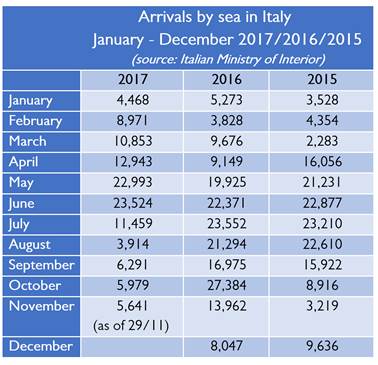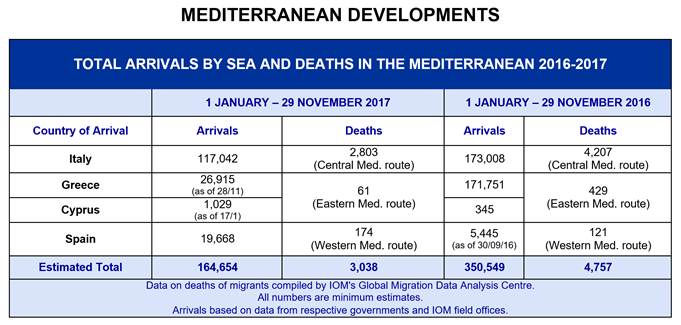-
Who we are
WHO WE AREThe International Organization for Migration (IOM) is part of the United Nations System as the leading inter-governmental organization promoting since 1951 humane and orderly migration for the benefit of all, with 175 member states and a presence in 171 countries.
-
Our Work
Our WorkAs the leading inter-governmental organization promoting since 1951 humane and orderly migration, IOM plays a key role to support the achievement of the 2030 Agenda through different areas of intervention that connect both humanitarian assistance and sustainable development.
What We Do
What We Do
Partnerships
Partnerships
Highlights
Highlights
- Where we work
-
Take Action
Take Action
Work with us
Work with us
Get involved
Get involved
- Data and Research
- 2030 Agenda
Mediterranean Migrant Arrivals Reach 164,654 in 2017; Deaths Reach 3,038
Geneva – IOM, the UN Migration Agency, reports that 164,654 migrants and refugees entered Europe by sea in 2017 through 19 November, with just over 70 per cent arriving in Italy and the remainder divided between Greece, Cyprus and Spain. This compares with 350,549 arrivals across the region through the same period last year.
IOM Rome reported Thursday (30 November) that, according to Ministry of Interior figures, 117,042 migrants arrived by sea to Italy this year – approximately 32 per cent fewer than arrived by sea to Italy up to this time last year.
Since 1 August 2017 a total of 21,825 men, women and children have arrived in Italy by sea from North Africa. That amount is fewer than the totals arriving in August alone both in 2015, and again last year. Overall, the months of August-November 2017 witnessed roughly one-quarter of the migrant total (79,615) that arrived in Italy last year during a similar period and less than half the total (50,667) arriving in 2015 during the same months (see chart below).

IOM Spain’s Ana Dodevska reported Thursday total sea arrivals reached 19,668, an increase of 850 arrivals since 19 November. Since Tuesday’s update – when IOM’s Missing Migrants Project marked the fourth consecutive year it has recorded more than 3,000 deaths in the Mediterranean – several new deaths were reported on the Western Mediterranean route.
On 28 November, the body of a man from sub-Saharan Africa was found off the coast of Cape Trafalgar, near Barbate, Spain. The next day, the Spanish Salvamento Marítimo recovered three bodies five miles south of Tarifa, Spain while rescuing two migrants, all of sub-Saharan origin. Another migrant was reported missing but has not been recovered to date, and is presumed drowned.
On Thursday, 30 November, the Moroccan Coast Guard rescued six occupants of a boat reportedly traveling with 34 migrants on board. The search for the 28 missing is ongoing as of Thursday evening, and is not included in today’s figures.
IOM Athens’ Kelly Namia reported Thursday (30 November) that just one landing of migrants had occurred in Greek waters during the dates 26-28 November, when Greek authorities reported the arrival of 18 migrants of unknown origin arrived on the island of Lesvos.
Missing Migrants Project (MMP) also reported that four migrants died near Thessaloniki, Greece after a smuggler drove a car off a cliff. Four migrants, as well as the smuggler and an accomplice, survived the incident.
Some 15,507 men, women and children have entered Greece by sea from waters of the Eastern Mediterranean since 1 August, or approximately 35 per cent more migrants (11,405) than entered during all of 2017’s first seven months. Through 25 November, the total number of sea arrivals to Greek territory is 26,915 (see chart below).

Worldwide, Missing Migrants Project has recorded the deaths of 5,136 people during migration in 2017. In addition to five new deaths at sea, and four on land, by migrants seeking entry into Europe, three more deaths were recorded in southern Mexico and along the US-Mexico border. One migrant, an adult male, was shot in a remote area of the Baboquivari Mountain Range, which lies roughly 27 miles southwest of Tucson, Arizona. The deaths of two migrants killed in train accidents in Mexico in February and May were also added to the global figures.
Missing Migrants Project data are compiled by IOM staff but come from a variety of sources, some of which are unofficial. To learn more about how data on missing migrants are collected, click here.

Latest Mediterranean Update infographic: http://migration.iom.int/docs/MMP/171201_Mediterranean_Update.pdf
For latest arrivals and fatalities in the Mediterranean, please visit: http://migration.iom.int/europe
Learn more about the Missing Migrants Project at: http://missingmigrants.iom.int
For more information, please contact:
Joel Millman at IOM HQ, Tel: +41 79 103 8720, Email: jmillman@iom.int
Mircea Mocanu, IOM Romania, Tel: +40212115657, Email: mmocanu@iom.int
Dimitrios Tsagalas, IOM Cyprus, Tel: + 22 77 22 70, E-mail: dtsagalas@iom.int
Flavio Di Giacomo, IOM Coordination Office for the Mediterranean, Italy, Tel: +39 347 089 8996, Email: fdigiacomo@iom.int
Hicham Hasnaoui at IOM Morocco, Tel: + 212 5 37 65 28 81, Email: hhasnaoui@iom.int
Kelly Namia, IOM Greece, Tel: +30 210 991 2174, Email: knamia@iom.int
Julia Black, IOM GMDAC, Tel: +49 30 278 778 27, Email: jblack@iom.int
Christine Petré, IOM Libya, Tel: +216 29 240 448, Email: chpetre@iom.int
Ana Dodevska, IOM Spain, Tel: +34 91 445 7116, Email: adodevska@iom.int
Myriam Chabbi, IOM Tunisia, Tel: +216 71 860 312 ext. 109, Mobile: +216 28 78 78 05, Email: mchabbi@iom.int

